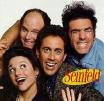The Show About Nothing

Masters of their Domains
Apologies for my long absence; I was on vacation in France for a week. I usually don't do personal bio material as blog topics, but a French trip report may be forthcoming (if Walgreens can get me those pictures!).
In the meantime, we'll talk about the "Show About Nothing". Seinfeld is #2 on my ranking, and the only thing that tipped it toward Lucy was probably sentimentality. In the first season, Seinfeld centered around Jerry and his career as a standup comic. The other 3 characters, Elaine, George and Kramer were really secondary at that point, in 1989. The show was cute, but not phenomenal. By season two, it became truly an ensemble cast where each character deliciously honed his or her neurosis and other characters came in to the mix. Seinfeld was able to explore the fear, trepidation and insecurities of four dysfunctional New Yorkers, who in some ways typify all of us. The insecurities would snowball, and crescendo into outrageously insane antics. Cases in point:
- a small dot on a new white sweater
- a boyfriend who fails to use an exclamation point on a birth announcement
- a boss who eats a Snickers bar with a knife and fork
- a girlfriend who always wears the same dress, or won't share your dessert
- a parking space that's too good to give up
- a girlfriend who once dated your gruesome acquaintance
Jerry went thru a hundred beautiful girls, ditching each (or getting ditched) over neurotically perceived peccadilloes. There's the masseuse who wouldn't give him a massage and then there's the woman who's name Jerry forgot, but it rhymed with a female body part (was it "Mulva"?). The hapless George tried too hard to get the girl (e.g., wearing a wedding band to seem unobtainable) but always landed flat on his face. Elaine was always exasperated at the absurdness of someone else's behavior but not mindful of her own inanity (e.g., ordering Chinese takeout to be delivered to a broom closet across the street, to remain within the delivery area). Kramer was in some ways the culmination of it all, a silly tousled hair man, who would take life an hour of impulsive giddiness at a time.
Already the ingredients were so fine; add Jerry and George's parents to the mix; an uncle who steals magazines, a portly unkempt postal worker for a neighbor and a J. Peterman boss who's missing a couple of screws. There you have it! The finest mix that exists in sitcomland. George's parents, in particular were hilarious. The "man-siere" episode in which Kramer and George's dad (Jerry Stiller) try to develop a bra for men with sagging boobs was a classic. The whiny mother could not have been better; she was a delight whether she caught the men wearing a bra, or caught her son in an act of self-gratification. Speaking of which, Seinfeld was excellent with word play. "Master of his domain" and "not that there's anything wrong with that" are now ingrained in our language. The show was nothing if not innovative with words and phrases that continue to amuse 8 years after the show went off the air. If you don't agree, well you'll have to "stuff your sorries in a sack".
Lastly, what impressed me, was the way that unrelated zany plot lines could be woven together in a final scene. Like "It's a Mad, Mad World" the show would take ridiculous zigs and zags, making every zig and zag collide together at the end in wonderful lunacy. The show was fast-paced, and in some ways had movie values in a TV medium (e.g., frequent scene changes, frequent set changes). You didn't get bored, and the shows stand up to repeat viewing. You need to catch every setup that you missed the first viewing. The show about nothing was, in fact, about everything. It seized on the trivia of life that can drive us into an obsessive-compulsive disorder; it took Jerry's observational style of comedy and mined it for a gazillion laughs, laughs that are as fresh now for syndication viewers as they were 10 years ago.
(This article is dedicated to my friend Al - a master of his domain and of Seinfeld)
Labels: Television








